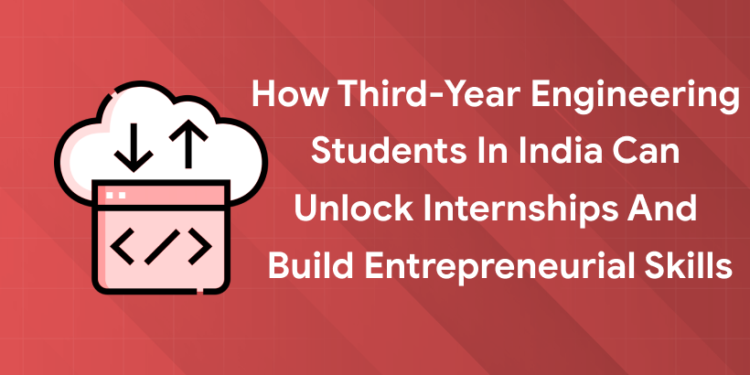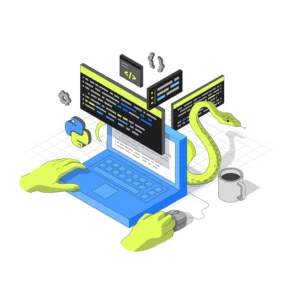Table of Contents
Key Takeaways:
- Exploring internships, projects, and mentorships in the third year is a crucial step for future startup founders and tech professionals.
- Real-world exposure in startups boosts problem-solving skills, innovation, and employability—coding and digital skills multiply these advantages.
- Leverage both traditional (alumni networks, campus drives) and digital platforms (LinkedIn, Startup India, Entri) to discover the best internship and startup opportunities.
- Hands-on coding courses with certification and placement assistance, like Entri’s, position students for both job and entrepreneurial success.
- Building a solid project portfolio and network is as essential as technical knowledge for launching a career or startup in India.
Introduction: Why Third Year is a Launchpad
The third year of college is more than just another academic milestone—it’s a turning point, filled with excitement and self-discovery, when students in India begin to imagine futures that extend far beyond textbooks and exam halls. This is often the year when ambition meets action: late-night discussions with friends morph into business pitches, side projects transform into promising ventures, and campus life brims with the energy of youth determined to leave an impact. The sense of possibility is palpable, as students grapple with questions of identity and purpose—eager to make the most of their limited time before graduation, and hungry for real-world experience.
In conversations, it’s common to hear tales of college entrepreneurs balancing code sprints with lectures, or teams drafting business plans between club meetings and hackathons. Even failures and missteps become part of the thrill, inspiring resilience and camaraderie. At its heart, the third year is about exploration: testing ideas, learning from mentors, and networking with peers who may become future co-founders. For many, this is the first taste of entrepreneurship and the bustling startup world—a space where practical skills, creative risk-taking, and meaningful connections are as important as academic achievements.
The Power of Exploring Opportunities Early
1: Which of the following data structures allows elements to be added and removed in a Last-In, First-Out (LIFO) order?
Building a startup is not just about launching products—it’s about understanding real-world problems, channeling creativity, and collaborating with diverse minds. The most successful founders and early-team members often start by pursuing internships, apprenticeships, and side projects well before graduation.
Why does this exploration matter?
-
Hands-On Insight: Internships at startups or tech firms immerse students in fast-paced environments where problem-solving, adaptability, and tech skills matter most.
-
Growth Mindset: Exposure outside classrooms develops resilience, leadership, and innovative thinking—qualities every founder or early-stage employee needs.
-
Networking Opportunities: Working in startups, attending hackathons, or taking part in business competitions forges connections with future mentors, co-founders, and investors.
-
Project Portfolio: Building digital products, coding solutions, or launching campus initiatives helps students showcase abilities on LinkedIn and GitHub, boosting discoverability for startup internship opportunities in India and job placements.
If the dream is to build a startup, third year is the perfect time to start stacking skills—combining coding, business acumen, and creative problem-solving—to stand out in India’s thriving innovation ecosystem.
Build Better, Together. 🛠️ Join the Entri Coding Community!
Beyond syntax, there’s strategy. 🚀 Join our subreddit for: Exclusive Coding Roadmaps 📍,Project Case Studies 📂 ,Interview Prep Tips 💡and more
👉 Join our Reddit communityUnlocking Internship & Startup Opportunities: Step-by-Step
1. Tap Digital Platforms and Networks
-
Use trusted online platforms like Startup India’s MAARG, LinkedIn, and AngelList to search for startup internships for engineering students in India or digital marketing trainee at Indian startups, and similar keywords. These bring up roles in trending fields such as AI, Machine Learning, App Development, and Web Development.
-
Stay alert to posts in campus groups, alumni circles, and tech communities where entrepreneurs often announce immediate openings. Proactive networking—sending thoughtful LinkedIn messages and sharing your coding or project portfolio—vastly improves chances.
-
Participate in hackathons and coding challenges to earn live project experience. Coding competitions and campus startup bootcamps remain prime arenas for recruitment and ideation.
2. Leverage Placement Cells and Alumni Ties
-
Approach the college’s placement cell for introductions to alumni working at innovative startups or as founders. These connections often unlock mentoring and referral-based internship opportunities not listed on public job boards.
-
Attend college-hosted business plan competitions and seminars, which attract startup founders seeking driven interns or future collaborators.
3. Focus on In-Demand Skills Through Certification
-
Courses in emerging domains—coding, data analytics, UI/UX, software testing, full-stack development—are in highest demand. Keywords like “placement assured coding courses in India,” “full-stack internship with certification,” and “best data science course for startup exposure” match recruiter preferences as well.
This is where Entri’s internationally recognized, placement-assisted coding courses are a natural fit. With structured curriculum, real-world projects, and access to hiring partners, students future-proof both job readiness and entrepreneurial ambitions.
Why Coding Skills Matter for Startup Builders
Coding is the universal language of modern startups—the skill that turns ideas into scalable solutions. Whether launching apps, developing digital businesses, or innovating in fintech and healthtech, coding knowledge is the backbone.
How Entri’s Coding Courses Bridge the Gap:
-
Courses span essentials like Python, Full-Stack Development, Data Science, Web and App Development, and Software Testing.
-
The curriculum includes project-based assessment, so every enrollee creates portfolio-worthy work—enabling students to display skills for both tech jobs and startup funding pitches.
-
Entri’s placement and mentorship support extends well beyond certifications—students receive resume reviews, mock interviews, and direct connections to both recruiters and startup founders.
-
Content designed with industry input ensures learning always matches current startup hiring trends. This hands-on, up-to-date education is critical for those wanting to build, join, or even lead a new venture in India’s booming startup scene.
Building Your Portfolio and Network: Essentials for Startup Pathways
A robust project portfolio makes candidates instantly more visible—especially to the innovative startups and tech companies leading recruitment in 2025. Think of each completed project, whether through a course or internship, as a sales pitch for your capabilities.
-
Use your third year to complete projects in domains like data analytics, web and app solutions, and automation—each makes for strong portfolio items on LinkedIn and GitHub.
-
Highlight certifications, like Entri’s Illinois Institute of Technology credentials, to increase searchability for “certified coding intern India” or “startup-ready developer.”
-
Document not only what you built but also how you solved real-world problems—emphasizing your readiness to innovate at a startup.
Networking is equally crucial: attend professional webinars, connect with fellow students and founders, and never hesitate to showcase your journey and learnings.
Build Better, Together. 🛠️ Join the Entri Coding Community!
Beyond syntax, there’s strategy. 🚀 Join our subreddit for: Exclusive Coding Roadmaps 📍,Project Case Studies 📂 ,Interview Prep Tips 💡and more
👉 Join our Reddit communityAction Plan: Your Roadmap to Startup Success
1. Build Core Skills and Knowledge
Begin with sharpening your fundamentals—whether it’s coding, design, marketing, or business analytics. Choose at least one programming language (such as Python or JavaScript) and focus on data structures, algorithms, and digital tools relevant to startup work. Entri’s project-based coding courses are ideal for building this foundation while gaining certification that stands out to recruiters and co-founders alike.
2. Work on Real-World Projects
Translate your classroom learning into hands-on projects. Identify problems that interest you: it could be a campus-based app, a website for local businesses, or an automation script. Plan, design, and implement these projects—then host your work on GitHub and share it actively on LinkedIn. Participating in hackathons or collaborating on student ventures will demonstrate initiative and problem-solving, which are core startup traits.
3. Seek Internships and Startup Exposure
Internships with startups and innovation-driven companies offer immersive, real-world experience. Use keywords like “startup internships for Indian students” and “placement-internship in tech startups” while searching on LinkedIn, AngelList, Internshala, and Entri’s placement portal. Don’t hesitate to reach out to alumni or mentors working at innovative companies—referrals and personal connections matter.
4. Build Your Network
Grow your professional network by attending webinars, online tech talks, business plan competitions, and startup meetups—sometimes these are the best places to meet potential co-founders, investors, or mentors. Stay active in communities on LinkedIn, GitHub, and coding challenge platforms. Networking is also about contributing: share your learnings, help peers, and participate in open-source or collaborative projects to increase your visibility and reputation.
5. Document and Showcase Your Journey
Keep a detailed, up-to-date digital portfolio (LinkedIn, GitHub, personal website) that showcases your projects, certifications, hackathon wins, and any entrepreneurial initiatives. Use search-friendly keywords and long-tail phrases like “student entrepreneur India,” “startup-ready developer,” and “full-stack coding intern certified by Entri” throughout your profiles. A strong online presence is vital, as recruiters and founders often discover talent through public projects and posts.
6. Upskill with Placement-Assured Courses
Invest in certification courses like those from Entri that offer both international recognition and hands-on, placement-assisted learning. These courses connect you directly with hiring partners and innovative startups, and their modular format lets you balance academics with professional growth. Entri’s mentorship and mock interview support are especially valuable for course participants aiming for top startup roles.
7. Prepare for Recruitment and Startup Launch
Update your resume to highlight not only your academic results but your skills, certifications, and contributions to real-world projects. Practice communication, problem-solving, and technical interview skills. If the entrepreneurial bug bites, follow the startup-building process: identify a real-world problem, validate your idea, assemble a team, and start with a minimum viable product (MVP). Leverage college startup incubators and government schemes like Startup India MyBharat for support, mentorship, and funding.
8. Measure, Reflect, and Iterate
Set clear goals: the number of applications, projects, or events participated in every semester. Track your progress, seek feedback from peers and mentors, and refine your strategy as needed. The journey isn’t a straight line—persistence, adaptability, and a willingness to learn from both success and setbacks are what define the best founders and early startup employees.
By following this action plan, third-year students can position themselves strongly for both placements and entrepreneurial adventures, making the most of a critical turning point in their academic and professional journeys.
Conclusion: Take the Leap—Start Today
Third year is not just about passing exams—it’s about making bold, strategic moves toward entrepreneurial or tech success. Start by seeking internships, networking, and taking proven, placement-backed courses like those from Entri. Combine this with a robust portfolio and an explorer’s mindset: that’s the formula for both job security and the freedom to start something of your own. Don’t wait—explore Entri’s internationally valid certification courses, transform knowledge into action, and step confidently into India’s exciting startup landscape.
|
Coding Courses Offered |
||
| UI/UX Design | Flutter Training | |
Build Better, Together. 🛠️ Join the Entri Coding Community!
Beyond syntax, there’s strategy. 🚀 Join our subreddit for: Exclusive Coding Roadmaps 📍,Project Case Studies 📂 ,Interview Prep Tips 💡and more
👉 Join our Reddit communityFrequently Asked Questions
Can students land good internships without coding experience?
While not every role requires coding, digital skills drastically improve your chances of landing competitive startup internships and building a versatile portfolio. Courses that start at beginner level, like Entri’s, are designed to bridge this gap.
How does Entri’s placement support work?
After completing a course, students receive career guidance, resume reviews, aptitude mock tests, and placement referrals directly to hiring partners—including several fast-growing Indian startups.
What’s the impact of certification on startup job searches?
Certification with hands-on projects (especially from reputed platforms like Entri) is often a requirement for top internships and helps you rank for roles like “startup coding intern” and “tech founder in training”.
How do you make time for projects during college?
Project-based courses with modular lessons (like Entri’s) allow flexibility, letting you balance academics and real-world learning without overload.















